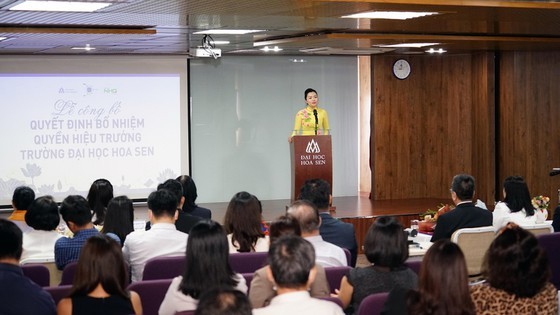
Investors have usually invited retired principals of public schools or famous educationists with Ph.D. degrees to be principals of private facilities.
According to a professor of Vietnam National University in Ho Chi Minh City, there are three existing styles of invitation for principals of private universities in Vietnam presently.
The first is the family-style. This means investor meets the statutory requirements to be a principal and then continues letting their children inherit the career; such as Duy Tan University, Binh Duong University. The professor believed that such an option is still long because it does not violate current regulations.
Second, investors are looking for employees who are retired public school principals to invite them to work as principals. This model is quite popular nowadays. According to an investor, this doesn’t violate the regulations and investors can hire experienced and capable principals.
Any principal that does not do well with these requirements, an investor will find a replacement for them. In contrast, investors with a short-term view, only focusing on profits, are often interested in how to recruit students well, open more facilities, buy more schools to expand the market and real estate. property, regardless of the input point and facilities investment or the training of young lecturers and science and technology transfer.
It doesn't matter who a principal is and whatever the model, they must follow investors’ direction. In recent years, principals of private universities have been constantly replaced. This is a rare phenomenon since the establishment of private schools during the past 32 years.
The Council of Hoa Sen University on July 12 decided to appoint 37-year-old Assoc. Prof. Dr. Vo Thi Ngoc Thuy, former Deputy Director of the Ho Chi Minh City Department of Tourism, as the school principal from August 1, 2021.
With the appointment of a new acting rector, Hoa Sen University has had five replacements of principals within just five years. Specifically, in 2014, after prolonged scandals, Dr. Bui Tran Phuong resigned as principal, and Dr. Luu Tien Hiep was appointed as a principal by the People's Committee of Ho Chi Minh City on January 17, 2017.
In September 2014, the higher education community in the country was stirred up by the news that 35-year-old Dr. Dam Quang Minh was appointed Rector of FPT University. At that time, a young person under 45 years old as a university president was unprecedented. But only two years later, Dr. Dam Quang Minh left the position.
After becoming the main investor of Hong Bang International University, Nguyen Hoang Group has invited Assoc. Prof. Thai Ba Can, former principal of HCMC University of Technology and Education to be principal of this university for the tenure 2015-2020. At the end of his term, Mr. Can became Deputy General Director in charge of the university division of this corporation and was succeeded by Assoc. Professor Ho Thanh Phong from October 2018. By April 2021, Assoc. Prof. Dr. Ho Thanh Phong left the position. Another school of the group, Gia Dinh University, has just replaced principal Dr. Ha Huu Phuc by Associate Professor Vo Tri Hao.
























